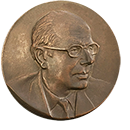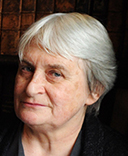Sir Misha Black Medal for Distinguished Services to Design Education
Professor Geoffrey Kirk RDI, who represents the Royal Academy of Engineering on The Awards Committee, read the citation for Professor P John Clarkson:
Design is becoming increasingly important for the future. There are changing demographics, increasing pressures on business and social services to deliver improved products and services and an increasing rate of technological change. Designers are required to adopt new methods of working, use new materials and acquire new skills. Design education is vital to this endeavour and it is just as fitting today that the efforts of educators are recognised for their contribution as it was when the medal was inaugurated forty years ago. This year there was an outstanding nomination for Professor John Clarkson.
Professor Clarkson has been at the forefront of Design Research, understanding the Design process and developing new tools and methods. There have been significant outcomes of his research into Process Management; Change Management; Healthcare Design; and Inclusive Design. He has also lead others as the Director of the Engineering Design Centre at Cambridge, a role he took over in 1997 from the first Director, Professor Ken Wallace, himself a recipient of the Sir Misha Black Award in 2002. He is a world-leader in all of his chosen areas of work and is ranked within in the top five engineering design academics in the world.
However this medal is not for his research but for the breadth of his work in design education, which has led directly to a significant level of training and education in industry, healthcare, universities and secondary schools.
For more than twenty years Professor Clarkson has been directly responsible for undergraduate and graduate design teaching at Cambridge. He has introduced authentic design challenges into the undergraduate and graduate curriculum. Master’s level courses now include modules teaching the use of practical design tools alongside reference to real design challenges from the food and drink, pharmaceutical and engineering sectors. His previous success as a designer and manager with PA Consulting Group continues to inform his pragmatic approach to design education as a sequence of creative and evaluative activities focused on resolving users’ needs within a competitive, cost-sensitive environment.
Collaboration with the Royal College of Art, led to the development of new approaches to design for the elderly and disabled, where he pioneered the use of population data in an exclusion audit tool to enable designers to assess how many people cannot use a particular product or service. His development of guidance on Inclusive Design has led directly to better design from industry and the introduction of authentic design challenges in secondary education. He also defined effective design approaches for inclusive design, leading to the publication of a seminal book in 2003 which provides the core content for the British Standard on managing inclusive design, an online Inclusive Design Toolkit and a range of web-based and physical impairment simulators.
The concept of better (inclusive) design has also been introduced to the Department for Work and Pensions, the Department for Transport, the Department for Education and the Cabinet Office. More recent work on visual exclusion with Unilever has transformed the design of graphics for online shopping, leading directly to the definition of international standards for such images. The Inclusive Design Toolkit also formed the basis of Designing Our Tomorrow, a unique resource for teaching design in secondary schools, which was developed in collaboration with the Department of Education and with support from the Royal Academy of Engineering, BT and ARM. The core content of this resource has been adopted by Government to define Design and Technology GCSE subject content and used as a resource for teaching in schools across the UK, Ireland and India.
He has also focussed on developing design resources, tools and training material for industry designers as well as the next generation of designers in schools. Consortia were formed to develop Inclusive design expertise in the BBC, Nestle, Marks & Spencer, Bosch Siemens, Royal Bank of Scotland, Roche, Bayer Healthcare, Morphy Richards, Transport for London, Proctor and Gamble, John Lewis, Stora Enso and Heathrow Airport, leading directly to the development of new, more accessible products and services.
His translation of engineering systems approaches for health and care delivery has facilitated clinician-led systems design and facilitated numerous improvements in patient safety and quality of care. In addition, he spent years developing design guidance for healthcare professionals. System safety assessment approaches, based on engineering risk assessment tools, led to a report for the Chief Medical Officer on Design for Patient Safety. This led to the development of a systems approach for improvement, Engineering Better Care, with the Royal Academy of Engineering, Royal College of Physicians and the Academy of Medical Sciences.
His knowledge and experience of the design process and engineering, accrued throughout an impressive industry and academic career, has resulted in an outstanding record of achievement of education in forms to inspire and educate designers, students, and non-design professionals.




